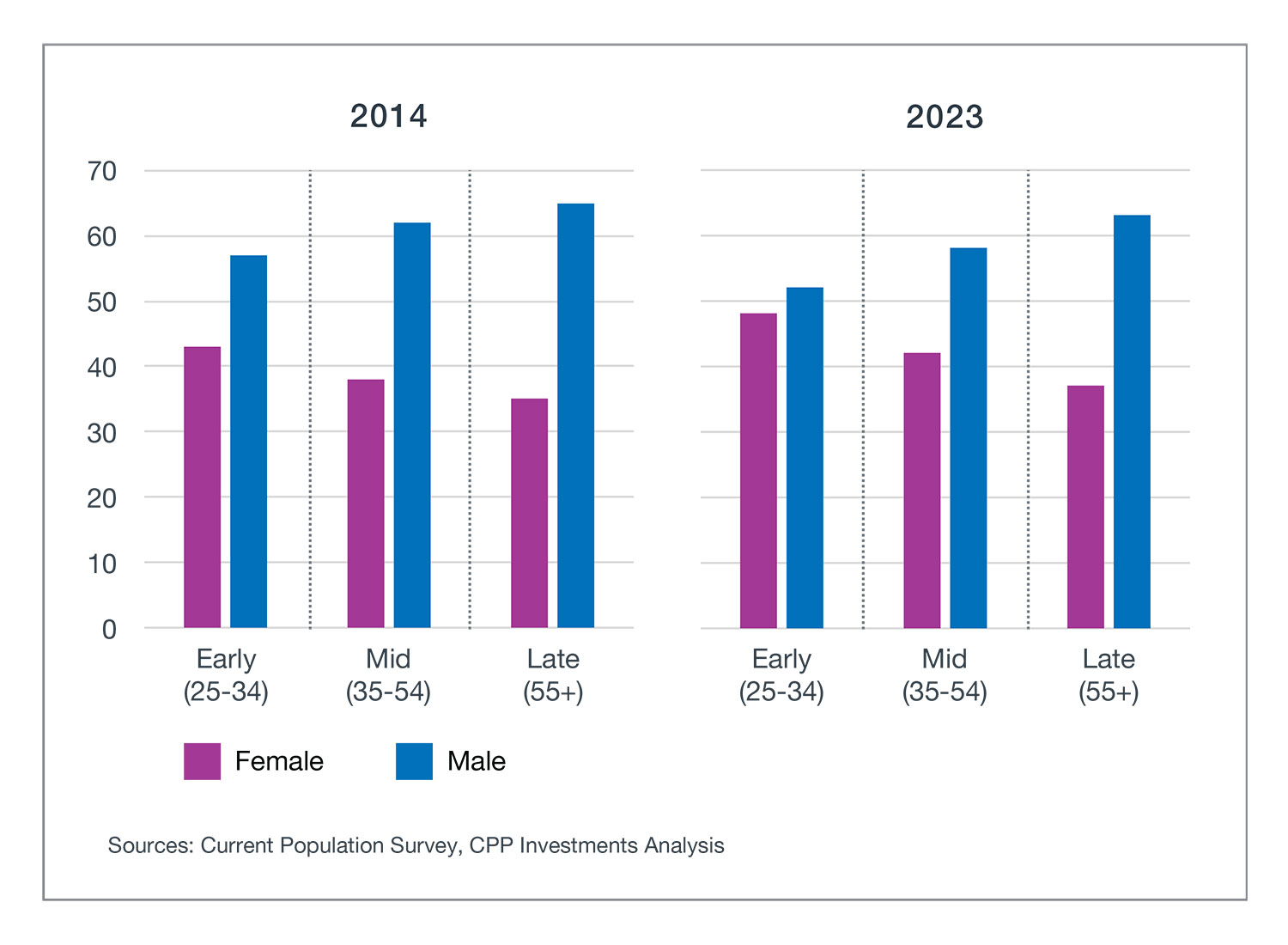
Women are approaching a critical milestone in the U.S. Entering 2024, those aged 25 to 34 accounted for a nearly 48% employment share in managerial roles—almost entirely closing a gap that has long favoured men. Progress on this front has been particularly swift. As recently as 2014, women in the early stages of their careers accounted for just 43% of managerial positions in the U.S.
What’s driving the push into management among younger women? A record gender gap in college attendance is one factor. In 2022, 48% of women with high school degrees enrolled in college compared to just 39% of men with the same degree. Their tendency to wait longer before starting a family (the average age of first birth has risen to 27.3 years compared with 25.6 years in 2011) has also likely enabled them to be more career-focused relative to men.
While younger women now seem to be competing on an equal footing to men at the beginning of their careers, it remains to be seen whether these gains will translate into greater representation later on. Indeed, women continue to face significant tradeoffs between starting families and their careers. And as the population ages, they are increasingly responsible for elder care. At the moment, growth in women’s representation in management at the mid and late career points continues to be stubbornly incremental—as does growth in their representation in senior management roles.
Michel Leduc, Global Head of Public Affairs and Communications, explores evolving industrial policy, concentration risks, and why investors
Video
January 31, 2024
Over the past several years, Ed Cass has seen first-hand how labour issues, political tensions and technological change have impacted asset
Article
January 31, 2024
Artificial Intelligence (AI) has the potential to revolutionize the way the global economy works and how many businesses generate profits.
Article
January 31, 2024
Women are approaching a critical milestone in the U.S. Entering 2024, those aged 25 to 34 accounted for a nearly 48% employment share in managerial roles—almost entirely closing a gap that has long favoured men. Progress on this front has been particularly swift. As recently as 2014, women in the early stages of their careers accounted for just 43% of managerial positions in the U.S. What’s driving the push into management among younger women? A record gender gap in college attendance is one factor. In 2022, 48% of women with high school degrees enrolled in college compared to just 39% of men with the same degree. Their tendency to wait longer before starting a family (the average age of first birth has risen to 27.3 years compared with 25.6 years in 2011) has also likely enabled them to be more career-focused relative to men. While younger women now seem to be competing on an equal footing to men at the beginning of their careers, it remains to be seen whether these gains will translate into greater representation later on. Indeed, women continue to face significant tradeoffs between starting families and their careers. And as the population ages, they are increasingly responsible for elder care. At the moment, growth in women’s representation in management at the mid and late career points continues to be stubbornly incremental—as does growth in their representation in senior management roles. Five Minutes with Michel Leduc Michel Leduc, Global Head of Public Affairs and Communications, explores evolving industrial policy, concentration risks, and why investors Video January 31, 2024 “Challenge your beliefs”: Investing in times of geopolitical turbulence Over the past several years, Ed Cass has seen first-hand how labour issues, political tensions and technological change have impacted asset Article January 31, 2024 Who will win the global AI race? Artificial Intelligence (AI) has the potential to revolutionize the way the global economy works and how many businesses generate profits. Article January 31, 2024







